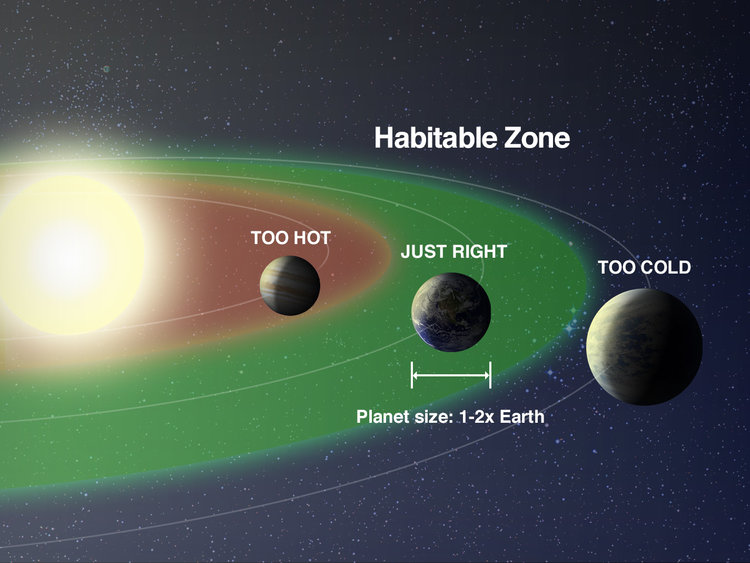Usually, when someone thinks of extraterrestrial life, they may go in a fictional direction and think of a green, humanoid being that is portrayed in so many movies and other media. This may in fact be a true portrayal somewhere in the universe due to its size, but life most likely will be discovered at the microscopic level, if discovered at all. Recent discoveries regarding hycean planets may accelerate that process, maybe even in the next couple years.
Hycean Planets
According to Jason Goodyer at Science Focus, hycean planets are more than two times larger than Earth, and can have atmospheric temperatures that reach 200ºC, alongside containing oceans of liquid water. If I were you, I would bring a fan or two, because it’s, well, a little warm to say the least. Another characteristic he states includes hydrogen-rich atmospheres, making it easier than Earth-like planets to detect, especially with the launch of the James Webb Space Telescope, pictured below. Its potential is endless for space discovery is limitless, surpassing even the Hubble Telescope. Maybe with a new influx of data, we might finally find the answer to this age-old question: is there life outside of Earth?

But even if hycean planets have a chance to be habitable, that does not mean it applies to every or any planet in this category. As I said earlier, the most sophisticated lifeform that will be likely found is probably a microbe or other tiny organism. In addition to this, there are so many different factors that must go right in order for life to develop. For example, a planet orbiting a star must be in the goldilocks zone, or just close enough that it is neither too hot nor cold to support said life. This keeps water at a liquid level, whereas it could evaporate or freeze elsewhere. The planet also needs to be the appropriate size. If Earth was smaller, it would have a more difficult time keeping up its atmosphere, and if it was larger, it would have a “crushing atmosphere,” according to National Geographic.

Despite this, scientists are broadening their search of habitable planets to these hycean worlds, even if they are two to ten times as large as Earth. Surprisingly, it is somehow possible to be habitable without a host star, acting like a rogue planet. But that’s a topic for another day. While we don’t have a hycean world in our solar system, there are many of them out there, and who knows what we’ll find someday…
First off, great post. I think that our search for life has been a very fascinating endeavor, especially because it’s scope is so big by necessity. But, I do have a question for you: Do you actually think that we will find life on these planets? Obviously, this might be too big a question, but I find it incredibly unlikely that we will find any life on these planets, mostly because of the extreme heat and pressure which would have to exist simultaneously for liquid water to exist. I wonder if that would suppress the formation of the carbon-based molecules required for life. Or if those conditions would make life formed there so unrecognizable that we can’t detect it. Just a thought.
I really enjoyed reading your post! It’s really interesting to think about whether or not there are other forms of life in our solar system, galaxy, the universe, etc. I believe some scientists recently have begun focusing on how disordered a star or planet is to determine if there are living organisms on that planet. For example, Earth, according to scientists, is in a very disordered state. They mentioned how there are elements and compounds that normally cannot coexist on planets, like methane and oxygen. However, they can coexist on Earth because living organisms are increasing the “disordered state” of our planet. Thus, by looking for planets that are more disordered than others, scientists hope to find planets with living organisms. There are so many approaches to find extraterrestrial life; when do you think humans will be able to find the first extraterrestrial life?
I really enjoyed the content of this post- additionally, your introduction really makes the reader feel comfortable with the piece as someone who doesn’t know of these concepts. I think the information you proposed regarding the hycean planets is both educational and fascinating. I can surely say that I don’t think I would have known about this without reading your post, and I think that’s really amazing way to contribute to these blog assignments. It truly seems like you are passionate about these topics, and you provide this information in a fun way to readers who would otherwise not know of them!
Loved this post because this has always been a topic that has fascinated me. You talk a lot about things needing to be “just right” in order for life to inhabit a planet. It seems like it might be impossible, but as you know there are infinitely many universes with infinitely many planets, so the possible that there is another planet out there that got it “just right” has to be true. The real question then becomes whether we’ll find them first or if they’ll find us.